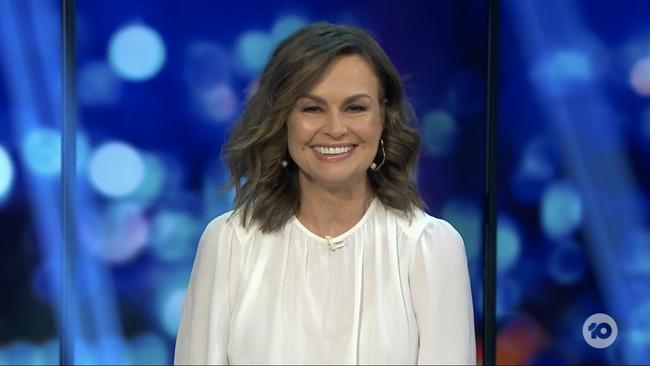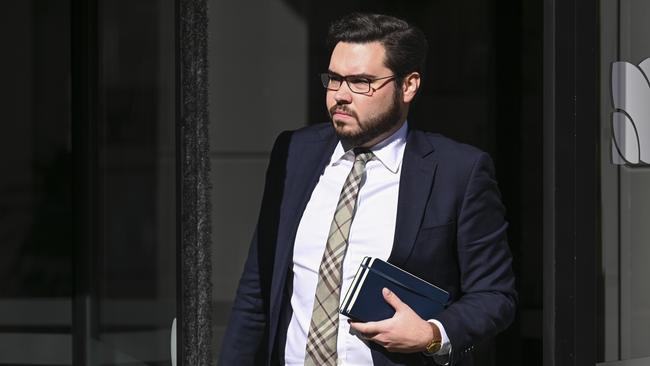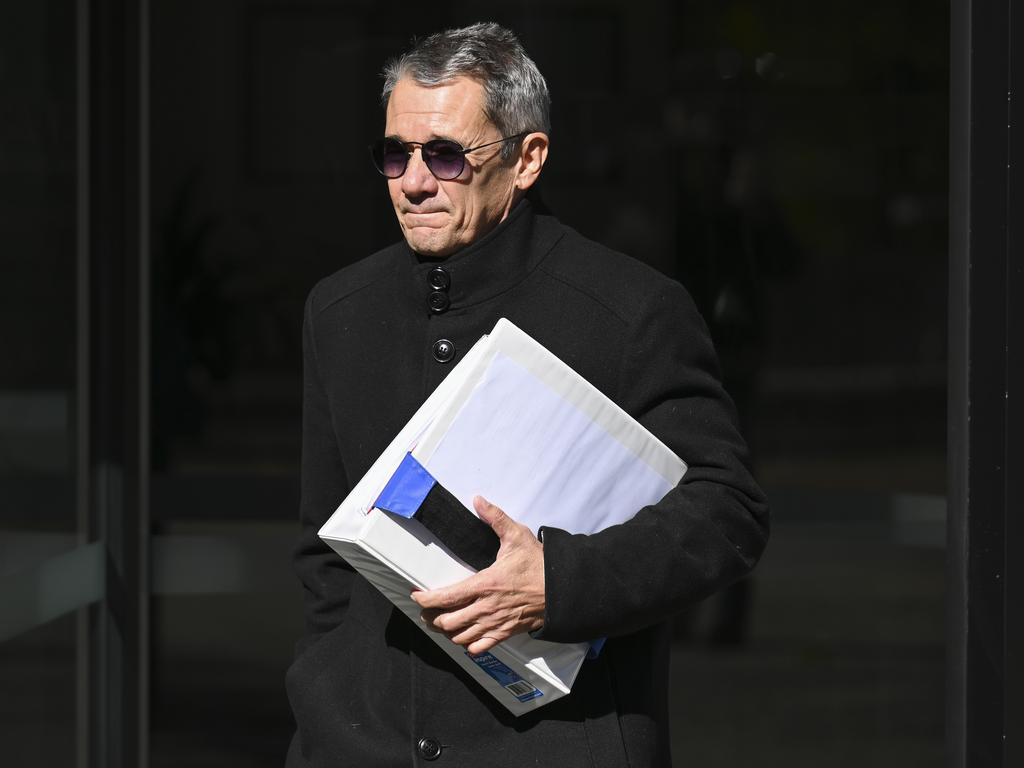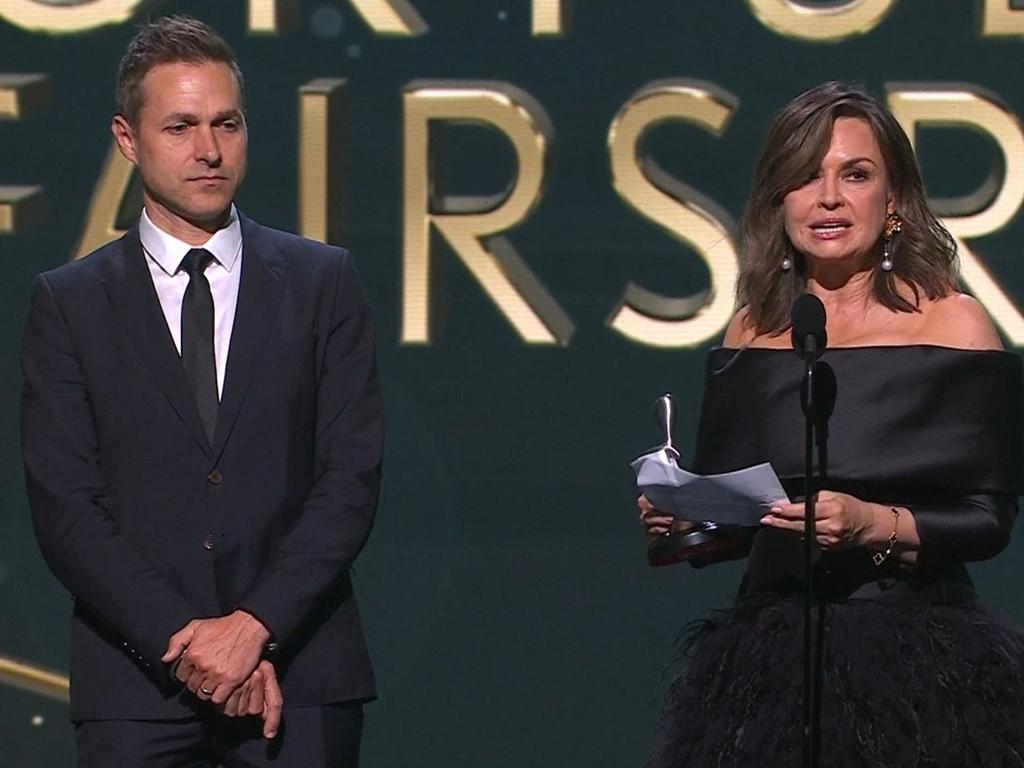Sofronoff inquiry: Lisa Wilkinson refutes DPP claims over Logies speech
TV presenter Lisa Wilkinson has sensationally denied Shane Drumgold’s claims that he warned her speech could delay Bruce Lehrmann’s rape trial.
TV presenter Lisa Wilkson has sensationally refuted claims by ACT chief prosecutor Shane Drumgold that he warned her that her Logies speech could result in a delay in Bruce Lehrmann’s upcoming rape trial.
Mr Drumgold claimed he told The Project host in a pre-trial conference days before the Logie Awards that the defence team could make a stay application “in the event of publicity”.
A file note to that effect was noted by Chief Justice Lucy McCallum, during the stay application to halt proceedings sought by Mr Lehrmann’s lawyers after Wilkinson’s Logie speech last June. Chief Justice McCallum ruled that the trial would have to be delayed by several months because of the prejudicial nature of the speech.

However, in a statement to the Sofronoff Inquiry Ms Wilkinson says Mr Drumgold “did not at any time” give her the warning he claimed.
Ms Wilkinson was recorded in the note tendered to court as having said “I am nominated for a Gold Logie for the Brittany Higgins interview” but points out in her statement to the Inquiry that she was never nominated for the Gold Logie and never said she was.
On Monday counsel assisting, Erin Longbottom KC, accused Mr Drumgold of making a false statement to Chief Justice McCallum during the stay application.
“Those statements were false,” Ms Longbottom put to Mr Drumgold. “They were knowingly false.”
Mr Drumgold has told the Inquiry he “misread the situation” in the meeting with Ms Wilkinson discussing her acceptance speech, but denied making “knowingly false” statements to a court during a push by Mr Lehrmann to halt the case.
Mr Drumgold had told the Chief Justice the note drafted by a junior lawyer in the DPP’s office was contemporaneous despite the references to the Logies speech being added by Mr Drumgold after the speech.
The Project show host said she was advised by her then solicitor, Marlia Saunders of Thomson Geer Lawyers, that she had called Mr Drumgold, who had confirmed that he had not given a warning to Ms Wilkinson me not to give the Logies speech and that Chief Justice Lucy McCallum’s statement to that effect was not correct.
Mr Drumgold told Ms Saunders that he would “give some thought as to how he could try and correct the public record, and may say something in open court,” Ms Wilkinson says.
Mr Drumgold told Ms Saunders he would seek to find a way to correct the record on the completion of the trial, but when she tried to contact him in December after the trial was abandoned she received no response to her calls, letters and emails.
Drumgold ‘formed early view on Lehrmann charge’
Mr Drumgold formed a view the Bruce Lehrmann should be charged with the rape of Brittany Higgins before he had been interviewed, the inquiry has head.
According to notes following a meeting between Mr Drumgold and Detective Inspector Marcus Boorman, Mr Drumgold said he was “pretty sure... that there should be sufficient evidence to charge the suspect” before Mr Lehrmann was interviewed by police.
In the notes, Mr Drumgold admitted to questioning Ms Higgins’ credibility, however said “I doubt Ms Higgins’ credibility will mean she could not be believed beyond a reasonable doubt.”
“I am pretty sure, and I think my colleagues are too, that there should be sufficient evidence to charge the suspect with one count of sexual intercourse without consent under s 54,” he said.
In response, Mr Boorman said it was “a bit early to form that view.”
“We still have outstanding lines of enquiry and we still have to interview the suspect,” he said.
However Mr Drumgold was adamant those were his “preliminary views.”
“As ever, let’s see what the brief looks like at the end of the investigation,” he said.
DPP backflips over ‘political conspiracy’
Mr Drumgold made an extraordinary about-face, backing down from his earlier claims that there was a political conspiracy to make the Brittany Higgins matter “go away”.
Mr Drumgold explosively said that former Liberal ministers including Linda Reynolds and Michaelia Cash, may have exerted pressure on police investigating Ms Higgins’ rape allegations to stop the case proceeding.
However on Thursday Mr Drumgold retracted those claims entirely.
Mr Drumgold’s counsel, Mark Tedeschi KC, initially asked him if he was subject to any political interference, to which Mr Drumgold replied: “I’m certainly not subjected to any political interference.”
Walter Sofronoff KC, who is presiding over the inquiry, then interjected.
Mr Sofronoff: “So I take the sitting here now having had available to you material that you haven’t seen before, you would acknowledge that your suspicions about the existence of political interference to prevent the case properly going ahead were mistaken?”
Mr Drumgold: “I do accept that.”
Mr Sofronoff: “Thank you.”
Earlier, Mr Drumgold claimed police officers tried to dissuade him from prosecuting Bruce Lehrmann using “inaccurate analysis” of the evidence at hand.
Mr Drumgold said police views that Mr Lehrmann should not be prosecuted were “too passionately held”, and were rooted in a weak analysis of evidence.
He said police analysis of the evidence, such as that in the Moller Report, was “stereotypical” and surface level.
“Their analysis of evidence in documents like the Moller Report display stereotypes analysis, by the way a complainant would behave,” he said.
“For example, thinking a genuine complainant would never go to the media. Or a genuine complainant would run off and report it and tell everyone immediately.
“These sort of stereotypical beliefs that there is a standard way a sexual assault victim would behave.”
Mr Drumgold also addressed claims from senior detective Marcus Boorman, who said he would resign if Mr Lehrmann was convicted as he strongly believed there was not enough evidence to convict.
“Clearly he’s lost objectivity to such an extent that he was going to resign,” Mr Drumgold said. “That is evidence that he had passionately held views … based on an inaccurate analysis.”
Juror who brought on mistrial was unwilling to convict
The juror who brought external research into the jury room during Bruce Lehrmann’s trial was the only juror unwilling to convict him of rape.
Mr Drumgold told the inquiry on Thursday afternoon he was convinced that all jurors were inclined to convict Mr Lehrmann of raping Ms Higgins, except one.
That one juror was the same juror who brought external research into the jury room which eventually led to the trial’s discontinuance, he said.
Mr Drumgold defended a speech he made following the mistrial, in which he said there was still a reasonable prospect of conviction.
“I needed to at least as part of my reasoning displace any belief that I had initially made a decision, but having reflected on the nature of the evidence in this case, that I had now had changed my position on the test of a reasonable prospect of conviction,” he said.
‘Sufficient evidence’ to charge Lehrmann before interview
Mr Drumgold formed a view the Bruce Lehrmann should be charged with the rape of Brittany Higgins before he had been interviewed, the inquiry has head.
According to notes following a meeting between Mr Drumgold and Detective Inspector Marcus Boorman, Mr Drumgold said he was “pretty sure... that there should be sufficient evidence to charge the suspect” before Mr Lehrmann was interviewed by police.
In the notes, Mr Drumgold admitted to questioning Ms Higgins’ credibility, however said “I doubt Ms Higgins’ credibility will mean she could not be believed beyond a reasonable doubt.”
“I am pretty sure, and I think my colleagues are too, that there should be sufficient evidence to charge the suspect with one count of sexual intercourse without consent under s 54,” he said.
In response, Mr Boorman said it was “a bit early to form that view.”
“We still have outstanding lines of enquiry and we still have to interview the suspect,” he said.
However Mr Drumgold was adamant those were his “preliminary views.”
“As ever, let’s see what the brief looks like at the end of the investigation,” he said.

‘Political impetus to charge Lehrmann’
A small diary note written by a police superintendent has indicated there was political impetus to compel Mr Lehrmann’s prosecution.
The note, written by Detective Superintendent Scott Moller, related to a conversation he had had with Deputy Chief Police Office Chew about whether or not Mr Lehrmann would be prosecuted for allegedly raping Ms Higgins.
The note read: “Insufficient evidence to proceed. DCPO advised he had a meeting with DPP who stated they would recommend prosecution … If it was my choice, I wouldn’t proceed. But it not my choice. There is too much political interference.”
Walter Sofronoff KC, who is presiding over the inquiry, asked on the inquiry’s fourth day if the note could be read as there being political interference to compel a prosecution.
“Do you think this could be read as there was insufficient evidence to proceed … but the thing would proceed, because there was political interference or political impetus to charge?” Mr Sofronoff asked ACT Director of Public Prosecutions Shane Drumgold.
“That is, that you were the subject of political interference, to compel, to persuade you to charge. This was not a reference to political interference, not to charge.”
Mr Drumgold replied, saying: “That was a possibility, but again, I’m looking at this through the prism of multiple strands in a cable.”
The possibility that there was political interference to proceed with trial comes following revelations on Wednesday that former senior Liberal ministers may have exerted pressure on police investigating Brittany Higgins’ rape allegations to stop the case proceeding.
Earlier today, Mr Drumgold claimed police were actively hunting for evidence to disprove Ms Higgins’ claims she was raped by Bruce Lehrmann.
Mr Drumgold once believed the police leaked Ms Higgins’ counselling notes to Mr Lehrmann’s defence lawyers in a bid to disprove her case.
He has since retracted that accusation, and said they were probably divulged to the defence “in error”.
However, when asked on the fourth day of hearings at the Sofronoff Inquiry into the handling of Bruce Lehrmann’s rape trial why he initially thought the notes were intentionally leaked by police, Mr Drumgold said it was a “range of issues”.
“First meeting (with police), 31st of March, I’m sort of hearing a case summary, but then I’m also being asked, we want to get evidence to disprove her claim,” he said.
“So the meeting is not logically about how I can strengthen a case, it was ‘we actually want to get evidence to weaken the case’. That was the nature of the conversation.
“The interpretation that I was placing on it was ‘we’ve got these text messages. She hasn’t handed her phone over, she’s gone to the media. Our clear view is this is dead … let’s get some evidence to kill it finally.’”
Mr Drumgold indicated concern that the officer who had ordered the counselling notes was a Deputy Chief Police Officer.
He said it was extremely rare for an officer of that level of seniority to be ordering evidence.
Further, he said the timing of the service of the counselling notes occurred at the same time the subpoena was handed over.
“That seemed to be very unusual,” he said. “I certainly had never seen it.”
“My perception at that time was that the police would have known of the protected nature … of the counselling notes that were in the brief … and they were served to defence before we got a copy of it.”
Mr Drumgold defended his decision not to “embrace” the full evidence brief included in the Moller Report, as much of it was “inadmissable”.
The report, which includes multiple explosive revelations outlining inconsistencies in Brittany Higgins’ statements regarding her alleged rape, is at the centre of tension between Mr Drumgold and the police.
Mr Drumgold said the police were “unhappy” that he hadn’t “embraced” the contents of the report.
“(The police) felt that I was being dismissive of these real issues that they were raising and again, I was just attempting to say trials are different in evidence,” he said.
“Much of this evidence is not admissible and much of it will be neutralised.”
Mr Drumgold was taken through various claims in the Moller Report, to say whether they were admissible and if not, why.
In regards to evidence Ms Higgins was reluctant to hand over her phone to police, Mr Drumgold said it was admissible and discussed at trial.
“There was evidence of a reticence to hand her phone over,” he said.
“But to my mind, there were many reasons why someone who was a complainant might not hand over her phone freely because of fear that there was material on there that might … find its way into the public domain.”
“It was correctly raised at the trial and, as I expected, it really didn’t go very far.”
Mr Dumgold also spoke to the fact Ms Higgins went to the media before giving her evidence in chief to police, saying the evidence had unfairly inferred this would impact her credibility as a witness.
“The inference was that that would in some way negatively affect the credibility,” he said.
“That’s not a logical connection.
“I’m quick to say not ideal, but the question that I’m answering is, does going to the media before the evidence in chief interview per se, impact her credibility … and the answer to that is unlikely.”
Mr Drumgold dismissed claims from Detective Superintendent Scott Moller that there was “little corroborative evidence” of sex between Brittany Higgins and Bruce Lehrmann.
In the Moller Report, Mr Moller concluded: “there is limited corroborative evidence of sexual intercourse taking place or consent being withdrawn or not provided. Investigators have serious concerns in relation to the strength and reliability of her evidence.”
He said the prosecution’s case relied solely on the credibility of Ms Higgins as a witness.
However, Mr Drumgold said there was corroborative evidence available in the form of a security guard finding Ms Higgins naked in the office she claimed she was raped.
“The basic complaint was that she had fallen asleep, woken up with somebody having sex with her, and then had fallen back off asleep … and a guard found her naked,” he said.
While there has been debate over the level of nudity Ms Higgins was found, she was found by the guard in some state of undress.
‘People look differently when drunk’
Earlier, Mr Drumgold defended his decision not to employ an expert witness to analyse CCTV footage of Brittany Higgins outside parliament house on the night she was allegedly raped to determine her sobriety.
Mr Drumgold said he rejected a proposal from the police to get an expert witness to watch the video to determine Ms Higgins’ sobriety.
This line of questioning came following revelations that despite Ms Higgins claiming she was “10/10 drunk” the night Mr Lehrmann allegedly raped her, CCTV footage showed her interacting with security staff and smiling and laughing, with no signs of being inebriated.
Mr Drumgold said he would have breached the Evidence Act had he taken the police’s advice by having an expert witness analyse the security footage.
“There is no recognisable field of evidence of observing drunk people,” Mr Drumgold said, under questioning from his counsel Mark Tedeschi.
“The police’s proposal was to find an expert, and I think they had a doctor in mind. a medical doctor to find an expert to give opinion evidence.
“I can’t recall exactly what I said (to the police), but I at least endeavoured to explain … that people look differently when they’re drunk.”
Mr Lehrmann has always denied he raped Ms Higgins and there have been no findings against him.

Lisa Wilkinson’s Logies speech
Mr Drumgold has defended himself against advice he gave journalist Lisa Wilkinson about whether or not she should mention Brittany Higgins in a Logie acceptance speech.
While he said he could not recall the exact words he said to Ms Wilkinson, he said “I thought I was clear” in directing Ms Wilkinson not to draw excessive publicity to Ms Higgins.
“I think I used words to the effect of any publicity,” he said. “I know she interpreted that as the trial. I think they’re the same things.”
“Ms Higgins wasn’t known as an entertainer, or there was no other aspect for her to be known, other than through her allegation.
“So, any publicity about Ms Higgins must be publicity about the reason. That was the mindset that I took.”
Mr Drumgold said it would have been “completely inappropriate” to “correct what had been said in the media about Ms Wilkinson” during his public announcement about the discontinuance of the trial.
“I would have gotted correctly chastised publicly for that,” he said. “This was about a trial, it was not about TV personalities’ reputation.”
Linda Reynolds’ ‘revealing’ text messages
Mr Drumgold has doubled down on claims Linda Reynolds attempted to assist the defence during the trial determining whether Mr Lehrmann raped Ms Higgins.
During the trial, it was revealed Senator Reynolds had sent a message to Mr Lehrmann’s lawyer, Steven Whybrow, SC suggesting he obtain text messages between Ms Higgins and her former colleague, Nicole Hamer.
Asked whether he still believes the message Senator Reynolds sent indicated she was attempting to coach the defence, Mr Drumgold said yes.
“The text messages use a specific word,” he said.
“That text message said, ‘You might want to look at these. You might find them revealing.”
“It’s pretty difficult for me to draw any other conclusion than she thought that those text messages might in some way assist him,” he said.






